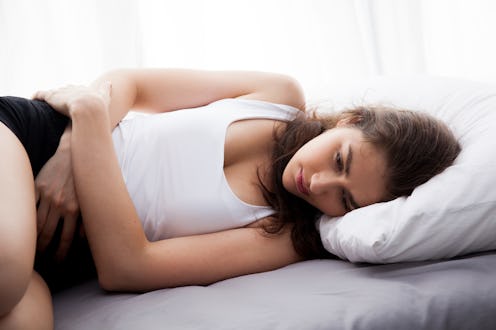Life
6 Methods To Get Rid Of Period Pain That Aren't Painkillers
When I get my period, there are a few things I like to do: lay fetal in bed and cry hysterically, eat Cheetos for every meal, and pop Midol like M&M's. If you're like me and try to avoid taking pills as much as possible, though, there are a number of methods to get rid of period pain that aren't painkillers — which means I can stop eating Tylenol out of a PEZ dispenser once a month. Score.
Being on the rag is kind of like running a giant experiment on yourself. You lay in 40 different positions to see which one best stifles the mind-numbing cramps presently tearing through your lower abdomen. You eat a pint of Ben & Jerry's to curb your junk food craving but then realize it didn't suffice; so you move on to Halo Top, Breyers, Magnum, and Dove to see which one really hits the spot. You binge-stream episodes of Friends but cry too hard every time Rachel rejects Ross, so you keep switching shows until you find something that doesn't make you sob uncontrollably, ultimately settling on Dance Moms.
Trying various brands of over-the-counter painkillers is no different; except in this case, NONE OF THEM EVER WORK the way you want them to. If menstruation frustration has you down in the dumps and pills don't do the job (or you just want another solution), try these methods to get rid of period pain that aren't painkillers.
1Drink Tea
If I was in the midst of life-ruining cramps and someone told me to just drink tea, I'd laugh and then rip their face off with my bare hands. But bear with me, for a moment. The University of Maryland Medical Center says that certain kinds of herbal tea— like cramp bark, turmeric, and black cohosh — can help alleviate period pain. Tea containing peppermint oil is another one. Note: it's important to check with your doctor before experimenting with these. Tea seems harmless, and it largely is; but sometimes, some herbal teas won't appropriately mix with certain medications. Science says some of these teas may behave like estrogen in the body, so if you have a history of hormone-related cancer or something similar, this may not be the solution for you.
2Try Acupuncture
In a nutshell, acupuncture works by relaxing the nervous system, helping to increase blood flow and possibly reduce inflammation. While more research is necessary, science has found promising evidence suggesting acupuncture (and acupressure, too) could reduce period pain. If needles freak you out, rest assured that half the time, you don't even feel them.
3Apply Heat
I used to scoff at this one (just like the teas), but science gives this two thumbs up. Research has found that heat applied topically could be just as effective as over-the-counter ibuprofen. In fact, it's been found to work faster — 90 minutes versus three hours for ibuprofen. And you can safely apply heat way more than you can safely take painkillers.
4Exercise (Or Have An Orgasm!)
Do we really want either of these when we're having our flo? Not sure. The idea is to release more endorphins, which can happen with a good sweat sesh or the big O. Don't think you need to spend an hour in the gym lifting heavy weights and sprinting around the track, either. It can be mild. Even simple stretching can help reduce period pain.
5Supplement Your Diet
Science says certain supplements could help make that time of the month a little easier. These include omega-3, calcium citrate, vitamin D, vitamin E, and magnesium. Here's why.
- Omega-3 could help lower inflammation.
- Calcium citrate helps maintain muscle tone.
- Vitamin D helps your body better utilize calcium and could also help reduce inflammation.
- Vitamin E prevents disease in the body associated with the heart and blood vessels, and it can increase energy and muscle repair.
- Magnesium levels fluctuate drastically throughout your cycle. Supplementing it could help with bloating, headaches, dizziness, and even sugar cravings.
6Massage The Cramps Away
It sounds too good to be true, but massage could be the answer. Even just 20 minutes could help. In one study looking at women with period cramps caused by endometriosis, participants who used massage experienced substantially reduced pain immediately and afterward. Research has found that massaging with essential oils could cause an even bigger positive impact. Also, you'll smell incredible afterward. Do it yourself or ask your SO for a hand (or two).
